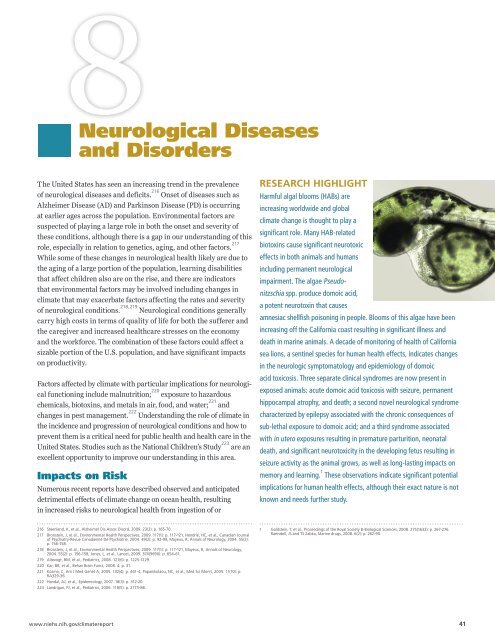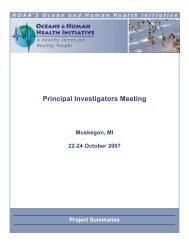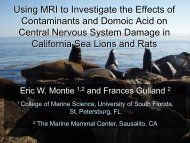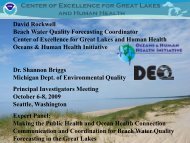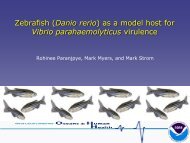A Human Health Perspective On Climate Change - The Oceans and ...
A Human Health Perspective On Climate Change - The Oceans and ...
A Human Health Perspective On Climate Change - The Oceans and ...
Create successful ePaper yourself
Turn your PDF publications into a flip-book with our unique Google optimized e-Paper software.
8NeurologicalDiseases<strong>and</strong> DisordersT he United States has seen an increasing trend in the prevalenceof neurological diseases <strong>and</strong> deficits. 216 <strong>On</strong>set of diseases such asAlzheimer Disease (AD) <strong>and</strong> Parkinson Disease (PD) is occurringat earlier ages across the population. Environmental factors aresuspected of playing a large role in both the onset <strong>and</strong> severity ofthese conditions, although there is a gap in our underst<strong>and</strong>ing of thisrole, especially in relation to genetics, aging, <strong>and</strong> other factors. 217While some of these changes in neurological health likely are due tothe aging of a large portion of the population, learning disabilitiesthat affect children also are on the rise, <strong>and</strong> there are indicatorsthat environmental factors may be involved including changes inclimate that may exacerbate factors affecting the rates <strong>and</strong> severityof neurological conditions. 218,219 Neurological conditions generallycarry high costs in terms of quality of life for both the sufferer <strong>and</strong>the caregiver <strong>and</strong> increased healthcare stresses on the economy<strong>and</strong> the workforce. <strong>The</strong> combination of these factors could affect asizable portion of the U.S. population, <strong>and</strong> have significant impactson productivity.Factors affected by climate with particular implications for neurologicalfunctioning include malnutrition; 220 exposure to hazardouschemicals, biotoxins, <strong>and</strong> metals in air, food, <strong>and</strong> water; 221 <strong>and</strong>changes in pest management. 222 Underst<strong>and</strong>ing the role of climate inthe incidence <strong>and</strong> progression of neurological conditions <strong>and</strong> how toprevent them is a critical need for public health <strong>and</strong> health care in theUnited States. Studies such as the National Children’s Study 223 are anexcellent opportunity to improve our underst<strong>and</strong>ing in this area.Impacts on RiskNumerous recent reports have described observed <strong>and</strong> anticipateddetrimental effects of climate change on ocean health, resultingin increased risks to neurological health from ingestion of orRESEARCH HIGHLIGHTHarmful algal blooms (HABs) areincreasing worldwide <strong>and</strong> globalclimate change is thought to play asignificant role. Many HAB-relatedbiotoxins cause significant neurotoxiceffects in both animals <strong>and</strong> humansincluding permanent neurologicalimpairment. <strong>The</strong> algae Pseudonitzschiaspp. produce domoic acid,a potent neurotoxin that causesamnesiac shellfish poisoning in people. Blooms of this algae have beenincreasing off the California coast resulting in significant illness <strong>and</strong>death in marine animals. A decade of monitoring of health of Californiasea lions, a sentinel species for human health effects, indicates changesin the neurologic symptomatology <strong>and</strong> epidemiology of domoicacid toxicosis. Three separate clinical syndromes are now present inexposed animals: acute domoic acid toxicosis with seizure, permanenthippocampal atrophy, <strong>and</strong> death; a second novel neurological syndromecharacterized by epilepsy associated with the chronic consequences ofsub-lethal exposure to domoic acid; <strong>and</strong> a third syndrome associatedwith in utero exposures resulting in premature parturition, neonataldeath, <strong>and</strong> significant neurotoxicity in the developing fetus resulting inseizure activity as the animal grows, as well as long-lasting impacts onmemory <strong>and</strong> learning. 1 <strong>The</strong>se observations indicate significant potentialimplications for human health effects, although their exact nature is notknown <strong>and</strong> needs further study.216 Steenl<strong>and</strong>, K, et al., Alzheimer Dis Assoc Disord, 2009. 23(2): p. 165-70.217 Bronstein, J, et al., Environmental <strong>Health</strong> <strong>Perspective</strong>s, 2009. 117(1): p. 117-121, Hendrie, HC, et al., Canadian Journalof Psychiatry-Revue Canadienne De Psychiatrie, 2004. 49(2): p. 92-99, Mayeux, R, Annals of Neurology, 2004. 55(2):p. 156-158.218 Bronstein, J, et al., Environmental <strong>Health</strong> <strong>Perspective</strong>s, 2009. 117(1): p. 117-121, Mayeux, R, Annals of Neurology,2004. 55(2): p. 156-158, Jones, L, et al., Lancet, 2009. 374(9690): p. 654-61.219 Altevogt, BM, et al., Pediatrics, 2008. 121(6): p. 1225-1229.220 Kar, BR, et al., Behav Brain Funct, 2008. 4: p. 31.221 Kozma, C, Am J Med Genet A, 2005. 132(4): p. 441-4, Papanikolaou, NC, et al., Med Sci Monit, 2005. 11(10): p.RA329-36.222 H<strong>and</strong>al, AJ, et al., Epidemiology, 2007. 18(3): p. 312-20.223 L<strong>and</strong>rigan, PJ, et al., Pediatrics, 2006. 118(5): p. 2173-86.1 Goldstein, T, et al., Proceedings of the Royal Society B-Biological Sciences, 2008. 275(1632): p. 267-276.Ramsdell, JS <strong>and</strong> TS Zabka, Marine drugs, 2008. 6(2): p. 262-90.www.niehs.nih.gov/climatereport 41


